
This was originally posted on .
Voters are facing an ugly surprise on their way to the voting booth on Tuesday. What most people don't realize is that since 2006, some 34 state legislatures have worked diligently to chip away at the fundamental right to vote -- and overwhelmingly, people of color are the target.
This year alone, have implemented legislation that would end same-day voter registration, limit early voting, and require voters to present forms of ID that many voters lack and cannot easily obtain. What do these measures have in common? Each would disproportionately impact African-American voters, making it more difficult for them to vote or have their vote count in a meaningful fashion.
To make matters worse, the Supreme Court pulled the rug out from under decades of effective voting rights protections in its decision in Shelby County v. Holder. The court's decision gave a free pass to state and local politicians manipulating voting laws for their own gain, allowing them to pick and choose who will be able to vote. That is why the right to vote is in danger across the country.
Some of these state legislatures, while attacking the right to vote, also diminish the value of each vote counted through all kinds of . Some recent examples include drawing boundaries of an election district to ensure that minority voters cannot constitute a majority, and "packing" minorities in only one or a limited number of districts to ensure they are a majority, which weakens the voting power of minority groups that could otherwise constitute an influential voting bloc. Smaller districts can also be drawn in such a way that the voting power of a minority group is reduced by dividing minorities into several districts that are predominantly white.
I know, the term "voting matters" has probably lost its value over the years because of over use, but it really does matter. Voting isn't just about electing candidates. It's about feeling a sense of dignity and empowering people to take part in the democratic process. It's about influencing policies and holding the federal and state governments accountable for promoting social and economic equity for ALL people.
Withholding the right to vote is a way to impose second-class citizenship on people who threaten the status quo. Throughout our country's history, the right to vote was denied to white men without property, African-Americans, women, Native Americans, Chinese-Americans, and adults under 21 years of age.
While the was adopted in 1870 and prohibited denial of the right to vote on account of race or color, in reality, African-Americans who wanted to exercise their right to vote were beaten, chased by dogs, bludgeoned by police and sometimes killed. It's somewhat unimaginable that African-Americans were only able to vote within recent memory -- with the passage of the Voting Rights Act of 1965.
But that's all history, right?
Some claim today, that America is no longer plagued by the racial injustice of the civil rights era. Unfortunately, less overt strategies have been implemented more recently to block African-Americans and other minorities from the ballot. I can't believe how close we are to losing what many fought so hard, and sometimes died, to achieve.
Now more than ever, new tools are needed to prevent voter discrimination before it happens. In January 2014, a bipartisan group of lawmakers introduced the Voting Rights Amendment Act (VRAA) to repair the damage done by the Shelby decision. Congress had the opportunity to pass a new, flexible and forward-looking set of protections that work together to guarantee our right to vote -- however, they failed to act on it.
In September, voting rights advocates, including myself, delivered petitions from over 500,000 voters seeking to restore VRA protections to the office of Speaker John Boehner. We found ourselves confronted by a locked door, perfect symbolism for the disenfranchisement many voters of color will experience come Tuesday. Next year the Voting Rights Act will be celebrating a dubious 50th anniversary, unless Congress acts immediately to pass new protections. Next week, voters of color will be immersed in the least protected election since the passage of the act in 1965.
The Voting Rights Act was born from the premise that all Americans have the right to vote -- regardless of race or language proficiency. It was critical to the civil rights movement, turning hateful policies like poll taxes and literacy tests into historical footnotes. We cannot allow those footnotes to be rewritten into modern forms of vote suppression.
If you have any questions about your right to vote in this upcoming election, contact the ACLU at letmevote@aclu.org or call the Election Protection Hotline at 866-OUR-VOTE (866-687-8683).
Learn more about voting rights and other civil liberty issues: Sign up for breaking news alerts, , and .



